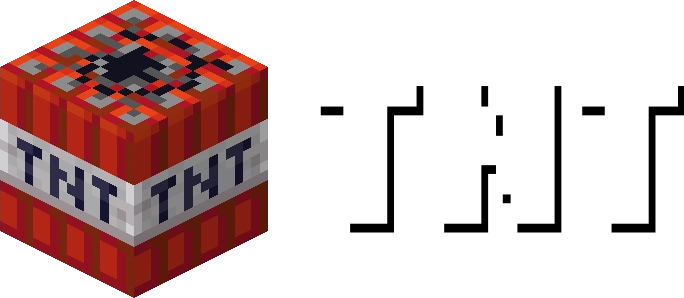https://github.com/EmortalMC/TNT
TNT is an experimental world format for Minestom
https://github.com/EmortalMC/TNT
minestom minestom-extension minestom-library
Last synced: about 1 month ago
JSON representation
TNT is an experimental world format for Minestom
- Host: GitHub
- URL: https://github.com/EmortalMC/TNT
- Owner: emortalmc
- License: mit
- Archived: true
- Created: 2022-07-21T13:23:01.000Z (almost 3 years ago)
- Default Branch: main
- Last Pushed: 2023-12-15T02:34:42.000Z (over 1 year ago)
- Last Synced: 2024-11-14T05:33:39.962Z (7 months ago)
- Topics: minestom, minestom-extension, minestom-library
- Language: Java
- Homepage:
- Size: 281 KB
- Stars: 32
- Watchers: 1
- Forks: 3
- Open Issues: 6
-
Metadata Files:
- Readme: README.md
- Funding: .github/FUNDING.yml
- License: LICENSE
Awesome Lists containing this project
- awesome-minestom - TNT - Experimental fast world format. (Libraries)
README

# TNT
TNT is a world format for Minestom designed for super fast 🚀 loading and portability.
TNT should only be used for small worlds.
## Check out the [polar](https://github.com/hollow-cube/polar) world format created by Hollow Cube. It handles version updates and will work better.
### ⚠ TNT is experimental and is not backwards compatible. Your worlds will break when TNT or Minecraft updates. It is highly recommended to keep your original worlds.
## Cool stuff
- Very fast loading times (23ms for my lobby - idk what Anvil is)
- Small file size (~80kb in TNT vs ~13mb in Anvil for my lobby)
- [Converts from Anvil automatically](#anvil-conversion)
- [Very portable - can be loaded from databases](#tnt-sources)
- Stores block nbt (e.g. sign text)
- Stores cached light from Anvil (useful because only minestom-ce has a lighting engine)
- [World saving](#saving)
Unfortunately does not save entities (yet) as Minestom does not have entity (de)serialisation.
# Usage
Importing via Gradle (browse versions [here](https://repo.emortal.dev/#/releases/dev/emortal/tnt/TNT))
```groovy
repositories {
maven { url "https://repo.emortal.dev/releases" }
}
dependencies {
implementation("dev.emortal.tnt:TNT:{releaseTag}")
}
```
Creating a Minestom instance
```java
InstanceContainer instance = MinecraftServer.getInstanceManager().createInstanceContainer();
TNTLoader tntLoader = new TNTLoader(instance, new FileTNTSource(Path.of("path/to/world.tnt")));
// or
TNTLoader tntLoader = new TNTLoader(instance, "path/to/world.tnt")
instance.setChunkLoader(tntLoader);
```
## Signs are blank? (or any other block has no data)
TNT needs some block handlers in order to load block data.
You can find some [example handlers in Immortal](https://github.com/EmortalMC/Immortal/tree/main/src/main/kotlin/dev/emortal/immortal/blockhandler) which are then registered like [this](https://github.com/EmortalMC/Immortal/blob/ea9f03249d01b7f2544bd96d588e6341d7bfbc99/src/main/kotlin/dev/emortal/immortal/ImmortalExtension.kt#L409)
## Anvil Conversion
In order for TNT to convert a TNT world automatically, the Anvil folder and TNT file need to be named the same and be in the same folder.
For example:
- /worlds/world/ <- Anvil world folder
- /worlds/world.tnt <- TNT world file (Put this path into the `TNTSource`)
You may also convert an anvil world to TNT manually with `TNT.convertAnvilToTNT(pathToAnvil, tntSaveSource)`
## TNT Sources
TNT worlds can be loaded and saved wherever you want (however only `FileTNTSource` is built in)
For example, you could make it read from Redis, MongoDB, MySQL or any sort of datastore.
You can do this by extending `TNTSource` and creating your own source.
## Saving
Use `TNT.convertChunksToTNT(chunkList, source)`